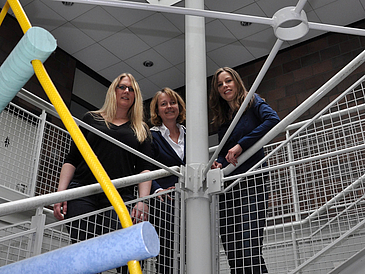The "CAMPUSideen" [Campus ideas] competition focuses on promising innovative business models that could form the basis for a start-up enterprise. In 2013 diverse university faculties entered a total of 43 ideas, for which the jury decided to award eight prizes. This year no less than five of the prizes were awarded for projects entered by the University of Bremen. This is the 11th time the Bremen university initiative "BRIDGE" has held the competition. BRIDGE is a scheme supported by the University of Bremen, the universities of applied sciences in Bremen and Bremerhaven, and the Bremer Aufbau-Bank. Every third competition entry ends up as a start-up enterprise. In the category “Student Entries”, University of Bremen projects took places 2, 3 and 5, with two second places in the category “Research Assistants”. “This is a great success for the University of Bremen”, says Prof. Kurosch Rezwan, Vice Rector for Research and Young Academics. “The innovative business ideas show that the university is not some kind of ivory tower, and that students and teachers are more than capable of facing challenges in the world of business.”
The University’s prize-winning projects one by one:
Theodor Hillebrandt, already a prizewinner in 2012, won a second-place prize for his “Underwater-Verification-Stick”. Hillebrandt, a student of electrical engineering, presented the jury with an idea for the development of a stick that is capable of removing bacteria by means of a straightforward technique involving ultra violet rays, even in polluted and murky water. The stick, no bigger than a fountain pen, employs solar cells and sensor technology to determine when the water is ready for drinking. His innovative idea could be of enormous benefit in developing countries or in finding drinkable water in remote areas.
Tobias Müller-Dechent, Christoph Müller-Dechent, Sebastian Zellerund and Dr. Guido Loyen received third prize for their project “FoodLoop mobile”. Via an IT platform and an integrated app, FoodLoop offers retailers a possibility to sell groceries approaching the end of their shelf-life at a discounted price. The idea would help to reduce waste and the losses incurred when products can no longer be offered for sale.
“Inductive energy transfer to recharge batteries under water” is the name of the project submitted by Annika Seebeck, Helge Pape, Matthias Hummert and Davide Terrasi from the department of electrical engineering. It took fifth place in the category “Student Entries”. The vulnerable point of every underwater camera is the battery chamber, which closes with a sliding flap and is not always watertight. The team led by Annika Seebeck has come up with a business idea to develop a product that completely dispenses with the need for any opening in the chamber. The battery can be recharged by means of a charging device and inductive energy transfer.
The “miRdetect Tumormarker” developed by Inga Flor, Kerstin Lucht-Hübner and Dr. Nina Winter from the Center for Human Genetics achieved a second place in the category “Research Assistants”. The innovative tumor marker makes it possible to diagnose and monitor testicular cancer using a blood or serum test. The aftercare treatment of testicular cancer patients calls for continuous monitoring via computer tomography. The new tumor marker could replace the CT examinations and cause a significant reduction in the radiation patients are otherwise exposed to.
The jury also awarded a second-place prize to Cord and Jette Winkelmann, both students of electrical engineering, for their “Sensory Surfaces”. Industrial machinery and equipment require high levels of system monitoring to ensure product quality, minimize the incidence of rejects, and enable smooth maintenance. Jette and Cord Winkelmann are marketing a new generation of sensor technology. Sensory surfaces are installed directly onto the components that have to be monitored. This makes it possible to carry out more exact measurements and, on the other hand, the surfaces can withstand extreme mechanical, thermal, and chemical conditions.
For more information, please contact:
Universität Bremen
Holger Runge
BRIDGE Gründungsunterstützung
Phone: +49 421 218-60 346
e-mail: holger.rugeprotect me ?!vw.uni-bremenprotect me ?!.de

